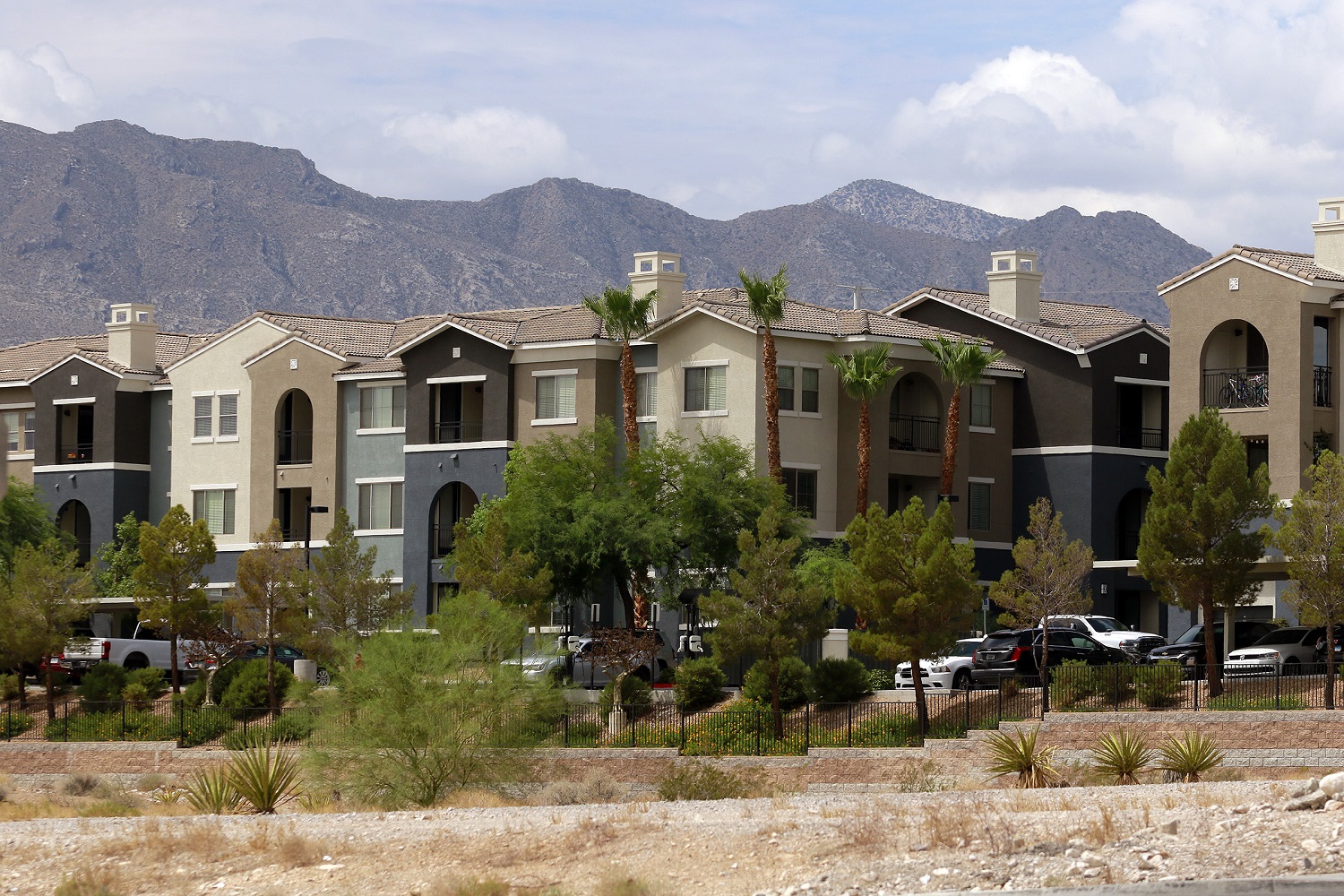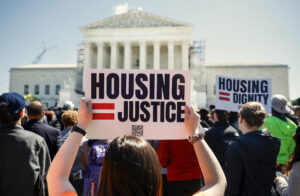6:23
News Story
Address rent now or homelessness later, lawmakers told
Legislature considering rent stabilization, other proposals to address high costs of housing
When Kristine Schachinger moved to Nevada nearly two decades ago after being priced out of the Virginia rental market, she was excited her $780 in monthly rent was not only affordable but meant she no longer needed to rely on a grueling work commute.
“In Virginia, I had to live 70 miles away from where I worked because I couldn’t afford housing,” she recently told lawmakers. “I’m afraid for the future of Nevada and that’s the way we’re going to go.”
Over the years, her rent costs slowly crept up with increases usually connected to improvements to her apartment. Last year alone, she saw a $300 increase and now pays $2,000 a month. She doesn’t know if she can afford the next increase.
Schachinger was among the numerous residents who recently spoke out against the drastic rent increases and called for state action at a recent legislative committee hearing.
Nevada lawmakers are mulling multiple ways to address the high costs of rent, whether through direct state action or by enabling counties to implement rent stabilization on their own.
Senate Bill 426, introduced by Democratic state Sen. Pat Spearman, would tie rent increases to the cost of living according to the Consumer Price Index, the main measure of inflation, and cap it at no more than 5%.
The bill received its first hearing in the Senate Commerce and Labor Committee April 7, but no action was taken on the proposal.
A separate measure, Senate Bill 371, seeks to make changes to Dillon’s rule, a governing principle that limits local powers that aren’t explicitly granted by the state.
That bill, which is scheduled to be heard Wednesday, would grant county commissioners the power to enact ordinances related to affordable housing “including, without limitation, rent control.”
Each bill has until Friday to pass out of committee or receive a deadline exemption in order to survive.
After hearing from countless residents in her district on the brink of homelessness, Spearman said it’s time for lawmakers to address rent increases.
“It is our responsibility as leaders to come together and find a solution to keep rents at a reasonable cost so that all Nevada residents have the opportunity to thrive,” she said.
Housing costs growing more than incomes
An estimated 43% of Nevadans rent.
According to a 2022 report from the National Low Income Housing Coalition, renters have to earn $23.70 to afford a two-bedroom apartment in Nevada.
With a minimum wage of $10.50, people have to work 62 hours a week to afford a studio apartment.
A 2022 report from UNLV determined that seven out of 10 of the top occupations in the Las Vegas metropolitan area and six out of 10 in Reno don’t pay enough for workers in those jobs to afford studio apartments.
Lawmakers approved legislation in 2019 to incrementally raise the minimum wage to $12 by 2024, a figure that was deemed palatable at the time.
Meanwhile, Clark and Washoe County officials estimate rent increases have jumped between 20% and 30% since the start of the pandemic.
“For a minimum wage earner, their wages are more than likely being outpaced by the increase of rental prices,” Spearman said. “Increasing rents affects all of our residents. However, the data demonstrates the gap between income and housing costs is largest for people of color, in particular women of color.”
The goal of SB 426, she said, was to “provide a relief to tenants while ensuring the landlords can maintain a fair and reasonable investment on their properties.”
SB 426 wouldn’t apply to “mom and pop landlords” who own a single property, landlords who live onsite at the property and would exclude new construction. Spearman said the intent of the bill was to target out-of-state investors who have swooped into Nevada to purchase properties and drive up rents.
“The primary goal of the bill is to strike a balance between affordability for tenants and reasonable return on investment for landlords,” she said.
Landlords can also apply for exemptions to the cap if the unit underwent capital improvements and had repairs due to damage, which would have to be approved by the Nevada Housing Division.
Without action in this legislative session, the elderly and disabled are going to be homeless in large numbers. – Jonathan Norman, Nevada Coalition of Legal Service Providers
Tenants would have to get a notice if a landlord is seeking an exemption and no rent increase can be implemented until it’s approved.
“Nevada residents have experienced a steady rise in rental prices, burdening many families and individuals who struggle to afford the ever increasing costs of housing,” Spearman said. “The consequences of this trend are far reaching and have forced people to make very tough decisions about their living situations often leading to overcrowding, relocation or even homelessness.”
Republican state Sen. Jeff Stone, who is also a landlord, said while tenants had a rough time in the pandemic, landlords “really had rough time too.”
Stone criticized the legislation arguing the bill would punish smaller landlords rather than investors, the intended target of the bill.
“For me, this creates an unequal playing field for smaller investors that are going to have caps on their rent increases not to exceed 5% even though you may have an inflationary factor of 8.5%,” he said.
He added that if the state approved the cap it would “exacerbate supply and demand issues” in housing supply.
Edward Goetz, an urban regional planning professor at the University of Minnesota who presented the legislation alongside Spearman, said there isn’t evidence that shows rent caps in other states led to a decline in housing construction.
“There have been studies in New Jersey, Massachusetts and California that do not show really any evidence that the construction of new housing falters in the presence of rent stabilization programs,” he said.
When it comes to investment in maintenance and property upkeep, he added there is “some evidence that minor or more esthetic kinds of maintenance will suffer in some cases.”
“The only study that showed a significant impact on the decline of the housing stock was a study of New York City,” he said. “It was restricted to rent control units, which had a very hard cap on them and that’s unlike the types of rent stabilization programs you see around the country and the type being proposed here.”
Address rent now or homelessness later
In more than two and a half hours of testimony, the measure drew support from legal groups, housing justice advocates and renters.
Also among its supporters were various labor unions including the Culinary Union, which attempted to bring a ballot measure in 2022 to cap rent increases at 5% in North Las Vegas.
The City of North Las Vegas determined the union didn’t receive enough signatures for the ballot measure to qualify, a move which some experts determined was a “bad faith” reading of state law. The Culinary Union originally threatened to sue, but quietly backed off.
Ted Pappageorge, secretary-treasurer for the Culinary Union, testified alongside Spearman saying union members have faced rent increases as high as $600 in the last couple years.
Jonathan Norman, the statewide advocacy, outreach and policy director for Nevada Coalition of Legal Service Providers, said if nothing is done to address rent, the biggest issue of the next legislative session in 2025 will be how to address the rise of seniors who are experiencing homelessness.
“Without action in this legislative session, the elderly and disabled are going to be homeless in large numbers,” Norman said.
The Vegas Chamber, the Nevada State Apartment Association and the Nevada Realtors Association testified in opposition.
“We need to be mad at the institutional owners out there, absolutely,” said Tom Blanchard, president of Nevada Realtors. “Let’s not throw the baby out with the bath water and kill all those great landlords that are out there doing the right thing.”
Dylan Keith, a lobbyist with the Vegas Chamber, said lawmakers need to focus on addressing the extreme shortage of housing supply.
“This bill would not do that,” he said. “What will is speeding up licensing requirements and making abatements for affordable housing units.”
Lawmakers this session have already heard two other proposals to regulate rent increases for specific populations.
Assembly Bill 298, would cap rent at 10% to people older than 62 or those relying on disability benefits from July 1, 2023 through Dec. 31. 2024.
Senate Bill 275 would limit increases at manufactured home parks.
Neither measure has passed out of committee ahead of the Friday deadline.
Our stories may be republished online or in print under Creative Commons license CC BY-NC-ND 4.0. We ask that you edit only for style or to shorten, provide proper attribution and link to our website. AP and Getty images may not be republished. Please see our republishing guidelines for use of any other photos and graphics.




